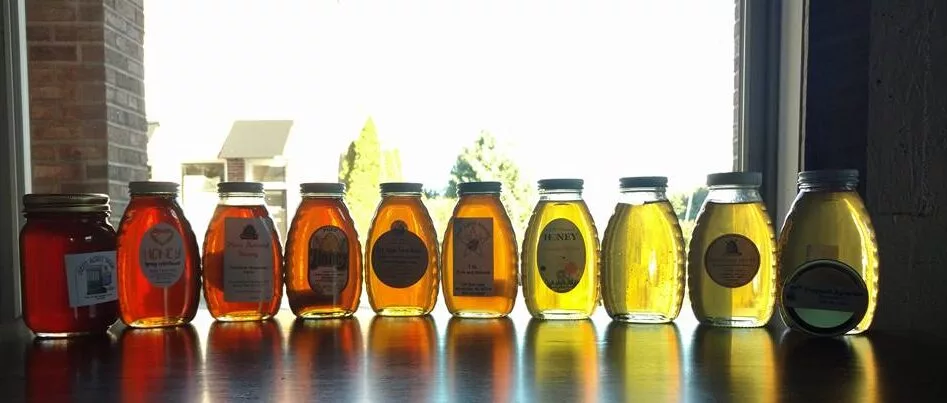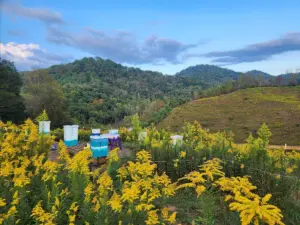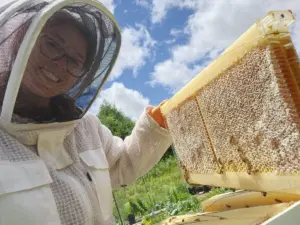
Despite the unusual weather in the year following Hurricane Helene, in spite of the rash of invasive plants blooming in newly cleared areas, and with the help of generous donations from beekeepers and friends across the state, more than 20 beekeepers from Mitchell, Avery and Yancey counties are expected to enter their local honey in the Tenth Annual Mayland Black Jar Honey Tasting Contest hosted by the Toe Cane Beekeepers Association (TCBA) on December 10 at the Homeplace Beer Company in Burnsville.
“Hurricane Helene destroyed hundreds of beehives in Mitchell, Avery and Yancey counties, knocked down thousands of acres of trees and vegetation honey bees depend on for nectar, damaged and destroyed homes, and resulted in the death of a family of local beekeepers,” said Ann Concannon Coomber, TCBA president, “but like many other local residents, the area’s beekeepers refuse to be kept down and continue to produce a variety of excellent honeys.”
Camille Collins, who tied for third place in last year’s contest, is one of several beekeepers who lost both her home and her honeybee colonies to Helene. “Last year I submitted my last jar of honey after finding my honey bucket in the wreckage of my barn,” said Collins. “This year, I have a lot to choose from! That wouldn’t have been possible without the TCBA and other beekeepers from across the state who donated equipment and bees. They were instrumental in getting me back up and running.”
With help from other TCBA members, she rebuilt her apiary and her garden to be well above the floodplain. “My new apiary is now high on a hill and away from the Cane River,” said Collins.
The TCBA acted as a distribution point for donated equipment, nucleus hives, sugar, and other supplies to help beekeepers rebuild the honeybee population in this hard-hit area.
A Variety of Flavors
Consumers who buy commercial honey in big box stores are often surprised when they see the variety of honey flavors and colors available from local beekeepers. Because most local beekeepers don’t blend their honey, the color and flavor imparted by the nectar the bees collect vary from season to season and location to location. Many local beekeepers, including Collins, said their spring honey was darker and more robust than in prior years, possibly because of the early spring. You can get a taste of these varieties at the contest and judge for yourself.
To sample the local honey and to cast a vote for the best flavor, stop by Homeplace on Wednesday, December 10, from 6 to 8 p.m. Honey samples are free, and voting is open to anyone for a $10 fee. If you enjoy a pizza or beer while you are there, ten percent of your purchase will go to benefit the TCBA as part of Homeplace’s nonprofit night program.
The contest is called a “black jar” contest because the honey jars are blacked out to keep the entries anonymous until the judging is complete. All the entries are harvested in Mitchell, Avery, or Yancey counties in 2025.
In addition to the honey tasting, the event will feature a silent auction of items donated by local businesses and supporters, along with the opportunity to purchase local honey produced by area beekeepers. All funds raised will benefit the TCBA and its mission to support the bees and beekeepers of Mitchell, Avery, and Yancey counties.
If you are a beekeeper and wish to enter your honey in the contest, more information is available at https://toecanebeekeepers.net/
The Toe Cane Beekeepers Association is a 501(c)(3) tax-exempt nonprofit promoting sustainable beekeeping practices in Mitchell, Avery, and Yancey counties. The association supports the beekeeping community by encouraging cooperation among local beekeepers and through hands-on training, mentoring, classroom lectures, and guest speakers. For more information, to become a member, or to make a donation to the TCBA, visit www.toecanebeekeepers.net/ or email beek@toecanebeekeepers.net.

Caption: Camille Collins’ new apiary is located well above the Cane River, which destroyed her home and apiary last year. “The amount of goldenrod on my property felt especially abundant this year. I appreciate experiencing the unique taste and smell of that goldenrod honey for the first time,” she said.

Camille Collins and a frame of honey in her new apiary.




